How They Voted. Illinois Representatives’ Votes in Congress
Chronicle Media — June 10, 2015How They Voted. Illinois Representatives’ Votes in Congress
United States House of Representatives
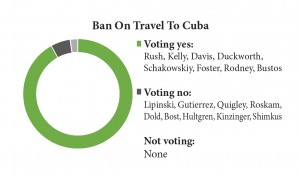 Ban On Travel To Cuba: Voting 176 for and 247 against, the House on June 4 refused to uphold an executive order by President Obama in January that would end a decades-long ban on most Americans’ travel to Cuba. The vote retained language in HR 2577 to keep the ban in place until the Cuban government has settled thousands of property claims filed by U.S. citizens. The underlying bill, which was later passed, authorizes a fiscal 2016 budget of $55.3 billion for several departments and agencies including the Department of Transportation. Under the order issued by Obama in January, Americans can avoid having to obtain a Treasury Department license to visit Cuba if they state broadly their travel is for educational or religious reasons or some other approved purpose.
Ban On Travel To Cuba: Voting 176 for and 247 against, the House on June 4 refused to uphold an executive order by President Obama in January that would end a decades-long ban on most Americans’ travel to Cuba. The vote retained language in HR 2577 to keep the ban in place until the Cuban government has settled thousands of property claims filed by U.S. citizens. The underlying bill, which was later passed, authorizes a fiscal 2016 budget of $55.3 billion for several departments and agencies including the Department of Transportation. Under the order issued by Obama in January, Americans can avoid having to obtain a Treasury Department license to visit Cuba if they state broadly their travel is for educational or religious reasons or some other approved purpose.
Barbara Lee, D-Calif., said the stoppage of travel to Cuba ” would eliminate flights that airlines have already invested in and would kill a new market for maritime carriers. Simply put, these provisions are an affront to Americans’ basic freedom.”
Ileana Ros-Lehtinen, R-Fla., said: “Is this chamber really going to side with a Communist tyrant in Cuba over American citizens? The Cuban regime should not be allowed to use American properties stolen from our citizens for its commercial benefit.”
A yes vote was to lift the Cuba travel ban.
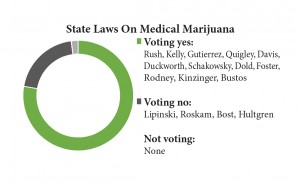 State Laws On Medical Marijuana: The House on June 3 voted, 242 for and 186 against, to prohibit federal law-enforcement authorities from interfering with state laws that permit marijuana to be cultivated, distributed, possessed and used for medicinal purposes. The District of Columbia, Guam and 39 states have such laws. Under federal law, the use, sale and possession of marijuana are criminal offenses. This amendment was added to a bill (HR 2578), later passed, that would authorize $51.4 billion in fiscal 2016 for the departments of Justice and Commerce, the National Aeronautics and Space Administration, the National Science Foundation and other agencies.
State Laws On Medical Marijuana: The House on June 3 voted, 242 for and 186 against, to prohibit federal law-enforcement authorities from interfering with state laws that permit marijuana to be cultivated, distributed, possessed and used for medicinal purposes. The District of Columbia, Guam and 39 states have such laws. Under federal law, the use, sale and possession of marijuana are criminal offenses. This amendment was added to a bill (HR 2578), later passed, that would authorize $51.4 billion in fiscal 2016 for the departments of Justice and Commerce, the National Aeronautics and Space Administration, the National Science Foundation and other agencies.
Dana Rohrabacher, R-Calif., said the government should “target terrorists, criminals and other threats to the American people rather than use…law-enforcement resources to prevent suffering and sick people from using a weed that may or may not alleviate their suffering.”
John Fleming, R-La., said marijuana “is not safe” and “is known to have brain development alterations, schizophrenia and other forms of mental illness, psychosis, heart complications and an increased risk of stroke.”
A yes vote was to bar federal interference with state medical-marijuana laws.
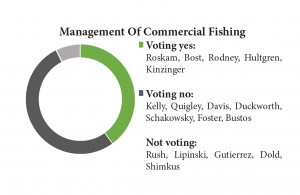 Management Of Commercial Fishing: Voting 225 for and 152 against, the House on June 1 passed a bill (HR 1335) to extend through fiscal 2019 the federal law for regulating commercial fishing in coastal waters ranging from three to 200 miles offshore. The law was enacted in 1976 to conserve stocks and prevent overfishing while protecting declining species and fragile habitats. This bill gives regional councils rather than federal authorities authority to set catch limits, based on what they judge to be sound science. Critics said the bill would scrap federally administered 10-year plans to restore depleted stocks while downplaying laws such as the National Marine Sanctuaries Act, Endangered Species Act and National Environmental Policy Act.
Management Of Commercial Fishing: Voting 225 for and 152 against, the House on June 1 passed a bill (HR 1335) to extend through fiscal 2019 the federal law for regulating commercial fishing in coastal waters ranging from three to 200 miles offshore. The law was enacted in 1976 to conserve stocks and prevent overfishing while protecting declining species and fragile habitats. This bill gives regional councils rather than federal authorities authority to set catch limits, based on what they judge to be sound science. Critics said the bill would scrap federally administered 10-year plans to restore depleted stocks while downplaying laws such as the National Marine Sanctuaries Act, Endangered Species Act and National Environmental Policy Act.
Don Young, R-Alaska, said the bill “is based on science. Rebuilding…stocks will be based on the biology of fish stock. Harvest levels will still be based on science and at levels where overfishing will not occur.”
Lois Capps, D-Calif., said “protecting and restoring…stocks requires that we both acknowledge the need to manage our fisheries and fund the science necessary to properly assess their health. Unfortunately, (this bill) does just the opposite.”
A yes vote was to send the bill to the Senate.
California Oil-Spill Compensation: Voting 155 for and 223 against, the House on June 1 defeated a bid by Democrats to require the pipeline company responsible for an oil spill last month near Santa Barbara, Calif., to compensate fishing interests and others suffering economic losses as a result of the discharge of about 100,000 gallons of crude into the Pacific Ocean. Fishing has been suspended indefinitely in a 138,000-square-mile area. This vote occurred during debate on HR 1335 (above).
Scott Peters, D-Calif., said: “Coastal communities deal with the harm from a spill long after the initial cleanup ends, and they deserve greater oversight over those who caused the damage.”
Rob Bishop, R-Utah, said “this amendment, you should simply throw it back. It is not a keeper.”
A yes vote was to adopt the motion, which, had it prevailed, would have immediately amended the bill.
United States Senate
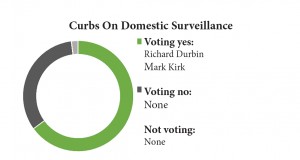 Curbs On Domestic Surveillance: By a 67 for and 32 against, the Senate on June 2 gave final congressional approval to a bipartisan bill (HR 2048) that would end the National Security Agency’s collection and storage of bulk data on Americans’ phone calls and other telecommunications under Section 215 of the USA Patriot Act. Under the bill, when the government requests Foreign Intelligence Surveillance Court permission to search telecom records involving U.S. citizens, it must provide specific information — short of probable cause — to identify its target in the context of a terrorism investigation. The government would then obtain its desired records as metadata (numbers, time and duration of the call) from telephone-company logs. Overall, the bill renews three sections of the USA Patriot Act that expired June 1.
Curbs On Domestic Surveillance: By a 67 for and 32 against, the Senate on June 2 gave final congressional approval to a bipartisan bill (HR 2048) that would end the National Security Agency’s collection and storage of bulk data on Americans’ phone calls and other telecommunications under Section 215 of the USA Patriot Act. Under the bill, when the government requests Foreign Intelligence Surveillance Court permission to search telecom records involving U.S. citizens, it must provide specific information — short of probable cause — to identify its target in the context of a terrorism investigation. The government would then obtain its desired records as metadata (numbers, time and duration of the call) from telephone-company logs. Overall, the bill renews three sections of the USA Patriot Act that expired June 1.
Richard Blumenthal, D-Conn., said: “If we were to say to the founders of this country that there will be a court that…issues opinions that are kept secret and …will have sweeping consequences in constitutional rights and liberties, they would say: `That sounds a lot like the courts that were abhorrent to us, so much so that we rebelled against the crown….`”
Richard Burr, R-N.C., said: “We are changing a program that didn’t have a problem and didn’t need to be changed, and we are accepting a lower threshold of our ability to intercept that individual in the United States who might have the intention of carrying out some type of an attack.”
A yes vote was to send the bill to President Obama, who signed it into law.
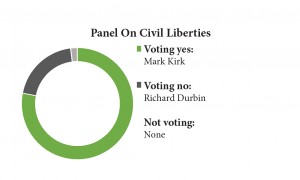 Panel On Civil Liberties: Voting 42 for and 56 against, the Senate on June 2 refused to weaken a “friend of the court” panel of civil-liberties specialists established by HR 2048 (above) to advise the Foreign Intelligence Surveillance Court. When the court weighs a novel or significant interpretation of the law, this panel would have standing to make arguments, possibly in opposition to the government’s petition. This amendment sought to keep the panel but hollow out its authority.
Panel On Civil Liberties: Voting 42 for and 56 against, the Senate on June 2 refused to weaken a “friend of the court” panel of civil-liberties specialists established by HR 2048 (above) to advise the Foreign Intelligence Surveillance Court. When the court weighs a novel or significant interpretation of the law, this panel would have standing to make arguments, possibly in opposition to the government’s petition. This amendment sought to keep the panel but hollow out its authority.
Orrin Hatch, R-Utah, said formation of the panel “threatens to insert leftwing activists into an incredibly sensitive and already well-functioning process….”
Al Franken, D-Minn., said this amendment would “render ineffective one of the safeguards for Americans’ privacy rights and civil liberties in the bill.”
A yes vote was to weaken the civil-liberties panel.
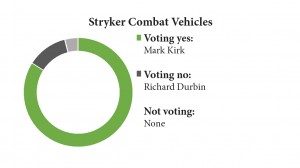 Stryker Combat Vehicles: Voting 61 for and 34 against, the Senate on June 4 provided $371 million in the fiscal 2016 military budget (HR 1735) for adding firepower to the Army’s heavily armored, rapid-deployment Stryker combat vehicle. The upgrade would consist, in part, of replacing the Stryker’s 50-caliber machine gun with a 30-millimeter canon at a projected cost of $3.8 million per vehicle. The $612 billion Department of Defense authorization bill remained in debate.
Stryker Combat Vehicles: Voting 61 for and 34 against, the Senate on June 4 provided $371 million in the fiscal 2016 military budget (HR 1735) for adding firepower to the Army’s heavily armored, rapid-deployment Stryker combat vehicle. The upgrade would consist, in part, of replacing the Stryker’s 50-caliber machine gun with a 30-millimeter canon at a projected cost of $3.8 million per vehicle. The $612 billion Department of Defense authorization bill remained in debate.
Rob Portman, R-Ohio, said: “The Army wants this. They are pleading for it because the soldiers who are there know they will not be able to perform their mission without this enhanced capability.”
John Reed, D-R.I., said the Army has not yet given this funding request a sense of priority. He asked, “Is this the most important program that we can invest $371 million in at this moment for the benefit of the Army?”
A yes vote was to adopt the amendment.



